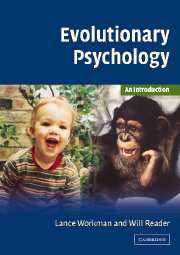Book contents
- Frontmatter
- Contents
- List of figures
- List of tables
- 1 Introduction to evolutionary psychology
- 2 Mechanisms of evolutionary change
- 3 Sexual selection
- 4 The evolution of human mate choice
- 5 Cognitive development and the innateness issue
- 6 Social development
- 7 The evolutionary psychology of social behaviour – kin relationships and conflict
- 8 The evolutionary psychology of social behaviour – reciprocity and group behaviour
- 9 Evolution, thought and cognition
- 10 The evolution of language
- 11 The evolution of emotion
- 12 Evolutionary psychopathology and Darwinian medicine
- 13 Evolutionary psychology and culture
- Glossary
- References
- Index
- References
13 - Evolutionary psychology and culture
- Frontmatter
- Contents
- List of figures
- List of tables
- 1 Introduction to evolutionary psychology
- 2 Mechanisms of evolutionary change
- 3 Sexual selection
- 4 The evolution of human mate choice
- 5 Cognitive development and the innateness issue
- 6 Social development
- 7 The evolutionary psychology of social behaviour – kin relationships and conflict
- 8 The evolutionary psychology of social behaviour – reciprocity and group behaviour
- 9 Evolution, thought and cognition
- 10 The evolution of language
- 11 The evolution of emotion
- 12 Evolutionary psychopathology and Darwinian medicine
- 13 Evolutionary psychology and culture
- Glossary
- References
- Index
- References
Summary
Key concepts superorganic, cultural transmission, evoked culture, transmitted culture, dual inheritance theory, gene-culture co-evolution, culturegens, memes and memetics, imitation
The study of culture is usually the preserve of social anthropologists, sociologists and cultural theorists who have developed sophisticated theories to describe and explain cultural phenomena. Recently, there has been much interest in an evolutionary approach to culture. In contrast to many earlier theories these evolutionary theories attempt to provide ultimate rather than proximate explanations of culture. One of the biggest ultimate questions about culture is why do we have culture at all? From this perspective, the phenomenon of culture is not something that ‘just happened’; there is good evidence that human culture needs a particular sort of brain in order to sustain it. Therefore, there is a distinct possibility that the emergence of culture conferred some advantage to our ancestors in terms of their inclusive fitness (see chapters 2and 7). In addition to ultimate questions, evolutionists have also asked proximate questions. What, for example, are the cognitive processes that are necessary to enable the transmission of culture, what psychological factors can lead to changes in cultural practices and what is the relationship between culture and genes? The following chapter addresses these and other questions in exploring the relationship between evolution and culture.
- Type
- Chapter
- Information
- Evolutionary PsychologyAn Introduction, pp. 342 - 370Publisher: Cambridge University PressPrint publication year: 2004



